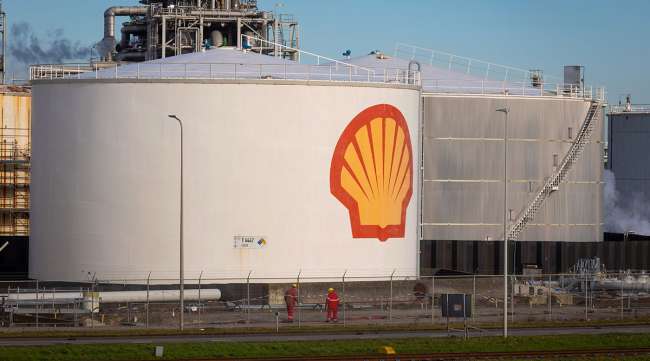A logo on an oil storage silo at the Shell Pernis refinery in Rotterdam, Netherlands. (Peter Boer/Bloomberg News)
Shell Plc’s former head of oil trading in the U.S. was stiffed on his 2020 bonus by more than $29 million, he claims in a lawsuit that shines a light on compensation inside the oil major’s lucrative trading unit.
John Dimech alleges that even though his unit’s profit doubled in 2020, his bonus for that year was little changed after Shell unexpectedly modified pay calculations, according to the lawsuit in federal court in Texas. If Shell had adhered to its established formula for calculating bonuses, Dimech claims he would have received about $40 million. But he only got about $11 million instead.
Shell doesn’t disclose the performance of its trading unit to investors. According to Dimech, the North America crude group boosted profit from already-record levels as businesses shut and people hunkered down at home during the onset of the pandemic.
“Shell has a competitive pay and benefits program, benchmarked across the energy industry,” a spokesperson for the London-based company said, declining to comment further on the ongoing litigation.

Dimech
The lawsuit was filed after an internal arbitration and attempts to negotiate didn’t bear fruit, according to the complaint in federal court in Houston. Shell is seeking to transfer the case to a court in the U.K.
Dimech, who had been based in Houston and left the company in 2021 for his home country of Australia, didn’t return messages seeking further comment.
Dimech worked for Shell for 30 years, including more than 20 years in the trading unit, according to the lawsuit filed in January. At the time referenced in the lawsuit, he was president of Shell’s trading arm in the U.S. and general manager of North America crude trading.
While it’s unclear how much money the North American crude trading group made in 2020, Shell’s trading profit averages close to $1 billion, Dimech said in separate court documents.
He argues that Shell executives repeatedly reassured him throughout 2020 that the commercial bonus program, a significant component of traders’ compensation package, wouldn’t be changed despite the extraordinary circumstances posed by the pandemic. Oil prices plunged into negative territory amid the lockdowns before quickly rebounding, with the volatile swing providing traders opportunity to book significant profit.
Justin Olsen, maintenance director at TCW, breaks down the hidden impact of poor trailer management on operations, compliance and safety. Tune in above or by going to RoadSigns.ttnews.com.
Despite the assurances, Shell changed the bonus calculations, resulting in a $29.4 million shortfall in his payout, he claims. Shell’s CEO at the time, Ben van Beurden, had total compensation of 5.84 million euros ($6.74 million) for that year and didn’t receive a bonus, according to data compiled by Bloomberg. Shell reported a $21.7 billion loss that year, mainly due to impairments and write-downs.
Dimech ran the trading unit’s bonus program for about 15 years and was responsible for calculating the payout for the commercial teams that included 80 employees in North America and 18 in Singapore, according to the suit. A recommendation from general managers such as Dimech is the first step in a lengthy process, and the payouts are ultimately approved by the company’s bonus oversight committee, according to separate court documents.
In past court filings, Shell has said bonuses are awarded at the company’s sole discretion. The oil major also has said payouts are based on performance, not as a percentage of the value of profit accrued during the year.







